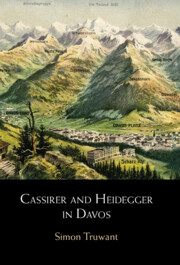4 results
8 - Cassirer’s Functional Conception of Philosophy
- from Part III - The Task of Philosophy
-
- Book:
- Cassirer and Heidegger in Davos
- Published online:
- 05 May 2022
- Print publication:
- 19 May 2022, pp 179-195
-
- Chapter
- Export citation
1 - Reconstructing the Davos Debate
-
- Book:
- Cassirer and Heidegger in Davos
- Published online:
- 05 May 2022
- Print publication:
- 19 May 2022, pp 15-44
-
- Chapter
- Export citation
10 - Enlightenment or Therapy
- from Part III - The Task of Philosophy
-
- Book:
- Cassirer and Heidegger in Davos
- Published online:
- 05 May 2022
- Print publication:
- 19 May 2022, pp 220-244
-
- Chapter
- Export citation

Cassirer and Heidegger in Davos
- The Philosophical Arguments
-
- Published online:
- 05 May 2022
- Print publication:
- 19 May 2022

